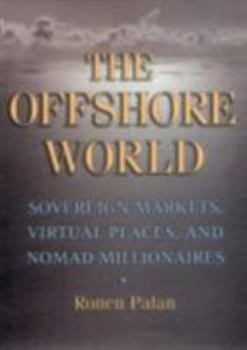The Offshore World: Sovereign Markets, Virtual Places, and Nomad Millionaires
Select Format
Select Condition 
Book Overview
The atlas of contemporary capitalism is curious indeed. A desperately poor and civil-war-wracked nation, Liberia, is the world's shipping superpower; the Cayman Islands the fifth-largest financial center in the world; land-locked Zurich a venerable "offshore" banking center. Indeed, it is estimated that half of the global stock of money passes through tax havens. The logic of the offshore world, where millionaires and corporations roam in search...
Format:Paperback
Language:English
ISBN:B00A2PIW8A
ISBN13:9780801472954
Release Date:March 2006
Publisher:Cornell University Press
Length:240 Pages
Weight:0.80 lbs.
Dimensions:0.6" x 6.1" x 9.0"
Age Range:18 years and up
Grade Range:Postsecondary and higher
Customer Reviews
2 ratings
Why? and How come? but not How? or What for?
Published by Thriftbooks.com User , 18 years ago
This book is primarily focused on why the offshore zones were created and what forces keep them alive and thriving. It gives you a very high level overview from a historical and political point of view. It doesn't explain the mechanics of the offshore, doesn't tell you how they function internally and doesn't tell you what they can be used for by the most of the readers. I'd name this book "History of the Offshore World", because it's really more a historical research and analysis. The book provides a lot of interesting facts but it's pretty hard to read. The style and structure don't highlight major topics and sometimes it starts looking like a braindump. The format is typical for a history book (a lot of text quotes, no graphs or formulas). But for the book of this size (small!) you probably finish it before you get bored. Also, if you are interested in how to offshore US jobs, how to start offshore project in India, how to save on your personal taxes etc - this book is pretty much useless, look for something else. Overall, if you are curious about the offshore and looking for some entry point to get started, this book will help you. But if you need some knowledge about offshore for business, this book probably won't give you any practical skills.
Postglobalization and the demise of the nation-state
Published by Thriftbooks.com User , 20 years ago
In slightly under 200 pages, The Offshore World contains an illuminating summary of the global "offshore" system, which comprises offshore banks, export processing zones (EPZs), international banking facilities (IBFs), offshore financial systems (OFCs) or tax havens, flags of convenience, the Euromarket. Note that if you want to do business with one of these entities, you will do better to head for London, Tokyo, Liechtenstein or New York than anywhere outside territorial waters. "Offshore" is a virtual space defined by its exemption from taxes, regulations and other annoying features of the nation-state.Ronen Palan brings an outstanding depth of knowledge of his subject to this book. He traces the roots of the offshore system to the late 19th century, when the concept of sovereign states was developing in ways that often presented obstacles to international traders. The result today is a system of non-sovereign states that has grown in parallel to, and generally with the support of, nation-states. Most of that growth has occurred since the late 1960's, at the time of the profitability crisis and the collapse of the Bretton Woods system. Today an estimated $2 trillion per day passes through the offshore foreign exchange market and 20% of total private wealth is parked in tax havens. And those figures are growing.Aside from the breath-taking sums that flow through a system outside tax or regulatory control, what are the political implications of offshore? Palen's thesis is that nation-states have lost control of the monetary system: The offshore tail is wagging the sovereign-state dog. Wealthy individuals and multinational corporations can simply pick up their financial assets and take them offshore if nation-states don't lower taxes and regulatory requirements to their dictates. And without sufficient funds democratic states are in no position to provide either their populations or offshore facilities with the services and security they expect. The paradox is that offshore has been an inevitable outgrowth of the division of the world into sovereign states. Professor Palan sees the growth of offshore accelerating. Sooner, rather than later, its dark matter will dramatically impact our visible world in ways we cannot yet foresee. "Offshore can end only when either the state system has ended its long half-millennial journey or capitalism itself has been replaced by another system."






